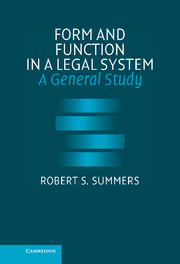Book contents
- Frontmatter
- Contents
- Preface
- Acknowledgments
- PART ONE INTRODUCTION, BASIC CONCEPTS AND DEFINITIONS, AND A GENERAL APPROACH
- 1 Introduction
- 2 Basic Concepts and Definitions
- 3 A General Approach
- PART TWO THE FORMS OF FUNCTIONAL LEGAL UNITS
- PART THREE THE OVERALL FORM OF A LEGAL SYSTEM AND ITS OPERATION
- Name Index
- Subject Index
1 - Introduction
Published online by Cambridge University Press: 29 July 2009
- Frontmatter
- Contents
- Preface
- Acknowledgments
- PART ONE INTRODUCTION, BASIC CONCEPTS AND DEFINITIONS, AND A GENERAL APPROACH
- 1 Introduction
- 2 Basic Concepts and Definitions
- 3 A General Approach
- PART TWO THE FORMS OF FUNCTIONAL LEGAL UNITS
- PART THREE THE OVERALL FORM OF A LEGAL SYSTEM AND ITS OPERATION
- Name Index
- Subject Index
Summary
“Theory is the most important part of … the law, as the architect is the most important … in the building of a house.”
– O. W. Holmes, Jr.“[Die Form] … ist im innersten Wesen des Rechts begründet.”
“Form is rooted in the innermost essence of law.”
– Rudolf von JheringPRELIMINARY OVERVIEW
Given the unfamiliar nature of this study, an extended preliminary overview is called for. The most fundamental question of law and legal theory is: What is the nature of a legal system? Many leading scholars and theorists of law in the twentieth century, including H. L. A. Hart and Hans Kelsen, viewed a legal system as essentially a system of rules. In developed Western societies, however, a legal system is far more than this. It is made up of diverse functional units only one major variety of which consists of rules. These diverse units are, in turn, duly organized in complex ways to form a system. To grasp the nature of a legal system, it is first necessary to understand the diverse functional units of the system. These include institutions, such as legislatures and courts, legal precepts, such as rules and principles, nonpreceptual species of law, such as contracts and property interests, interpretive and other legal methodologies, sanctions and remedies, and more. A discrete legal unit does not function independently. It must be combined and integrated with other units.
Information
- Type
- Chapter
- Information
- Form and Function in a Legal SystemA General Study, pp. 3 - 36Publisher: Cambridge University PressPrint publication year: 2005
